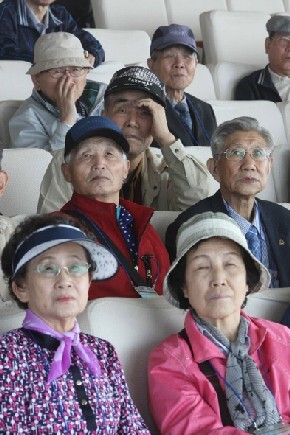hankyoreh
Links to other country sites 다른 나라 사이트 링크
S. Korean humanitarian aid groups restricted from traveling to North Korea

“Kaesong area: 415. Mt. Kumgangsan area: 45. Other areas: 0.”
This is how many South Koreans reside in North Korea as of Monday, as tabulated by the Ministry of Unification. This means that excluding personnel maintaining facilities in the Kaesong (Gaeseong) Industrial Complex and Mt. Kumgangsan Tourism Zone areas, South Koreans are not able to visit North Korea.
Since Seoul demanded the withdrawal of South Korean personnel in North Korea on March 4 prior to North Korea’s long-range rocket launch, civilian visits to North Korea to provide humanitarian relief or engage in economic cooperation projects have been virtually suspended. During that time, only one visit to an area other than Kaesong or Mt. Kumgangsan was permitted. Five officials with the Christian medical relief organization “Rose Club,” which is conducting a treatment program for infantile epilepsy in North Korea, visited North Korea on March 29 and returned on May 2. Applications by all other civilian groups to visit Pyongyang and other places are being canceled due to the government’s “request for cooperation.”
For a time, the government decided to actively consider “normalizing” visits to North Korea following “Kaesong contact” on March 21. However, currents within the government have once again frozen with the drawn out detention of Hyundai Asan employee Mr. Yu, which took place on March 30, and North Korea’s April 29 Foreign Ministry spokesperson statement regarding the possibility of a second nuclear test or long-range missile launch. A visit to Pyongyang by the Korean Sharing Movement and the International Corn Foundation planned for May 2 was canceled, and visits by civilian groups scheduled for Monday and Tuesday were likewise canceled.
Kang Young-sik, secretary-general of the Korean Sharing Movement said in contrast to the present situation, visits to North Korea by humanitarian relief groups were able to take place even after North Korea’s nuclear test in October 2006. He said for Seoul to cite safety issues and other reasons as justification for saying no to visits to North Korea to provide humanitarian aid or carry supplies was not enough. An umbrella organization comprised of about 50 aid groups working in North Korea reportedly plans to convene a meeting Wednesday to gather opinions on the recent situation and convey them to the government.
Please direct questions or comments to [englishhani@hani.co.kr]
Editorial・opinion
![[Editorial] Does Yoon think the Korean public is wrong? [Editorial] Does Yoon think the Korean public is wrong?](https://flexible.img.hani.co.kr/flexible/normal/500/300/imgdb/original/2024/0417/8517133419684774.jpg) [Editorial] Does Yoon think the Korean public is wrong?
[Editorial] Does Yoon think the Korean public is wrong?![[Editorial] As it bolsters its alliance with US, Japan must be accountable for past [Editorial] As it bolsters its alliance with US, Japan must be accountable for past](https://flexible.img.hani.co.kr/flexible/normal/500/300/imgdb/original/2024/0417/6817133413968321.jpg) [Editorial] As it bolsters its alliance with US, Japan must be accountable for past
[Editorial] As it bolsters its alliance with US, Japan must be accountable for past- [Guest essay] Amending the Constitution is Yoon’s key to leaving office in public’s good graces
- [Editorial] 10 years on, lessons of Sewol tragedy must never be forgotten
- [Column] A death blow to Korea’s prosecutor politics
- [Correspondent’s column] The US and the end of Japanese pacifism
- [Guest essay] How Korea turned its trainee doctors into monsters
- [Guest essay] As someone who helped forge Seoul-Moscow ties, their status today troubles me
- [Editorial] Koreans sent a loud and clear message to Yoon
- [Column] In Korea’s midterm elections, it’s time for accountability
Most viewed articles
- 1[Column] The clock is ticking for Korea’s first lady
- 2Samsung barricades office as unionized workers strike for better conditions
- 3[Editorial] When the choice is kids or career, Korea will never overcome birth rate woes
- 4[News analysis] After elections, prosecutorial reform will likely make legislative agenda
- 5Why Israel isn’t hitting Iran with immediate retaliation
- 6S. Korea, Japan reaffirm commitment to strengthening trilateral ties with US
- 7[Editorial] Does Yoon think the Korean public is wrong?
- 8[Guest essay] How Korea turned its trainee doctors into monsters
- 9[Editorial] 10 years on, lessons of Sewol tragedy must never be forgotten
- 10Strong dollar isn’t all that’s pushing won exchange rate into to 1,400 range